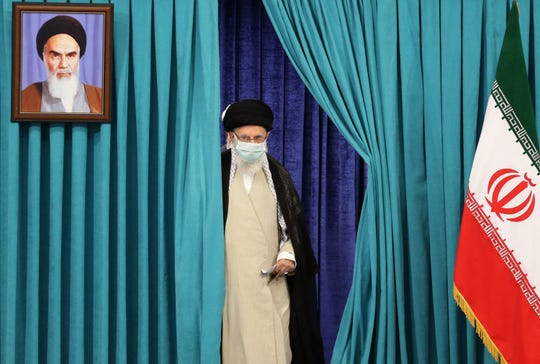Iranians vote in presidential election: 3 ways the outcome matters
Supreme Leader Ayatollah Ali Khamenei arrives to cast his ballot on June 18, 2021, in Iran's presidential election. (Photo: AFP via Getty Images)
Iranians cast votes Friday in a presidential election expected to be won by Ebrahim Raisi, a hardline candidate who appears to have the backing of Supreme Leader Ayatollah Ali Khamenei. Raisi is the chief of Iran’s judiciary and was the runner-up in Iran’s last presidential election in 2017. Polls opened at 7 a.m. local time for the vote and a result could come late Friday or early Saturday. Incumbent President Hassan Rouhani, a moderate, is stepping down because he has reached his term limit.
Rouhani served two four-year terms and broadly speaking he sought more engagement with the West. As supreme leader, Khamenei ultimately has the final say on all Iran’s domestic and overseas policy. However, the election of a new Iranian president could impact a range of issues, internal and external.
Here are three ways Iran’s vote matters:
The nuclear deal
Washington and Tehran, aided by European nations and Russia, are currently locked in talks over if, and on what terms, to resume a 2015 nuclear accord exited by former President Donald Trump. The field of candidates for Iran’s presidential election has been whittled down to just four – three hardliners and a centrist. A victory for Raisi could complicate those discussions. He was sanctioned by the U.S. over his involvement in the mass execution of Iranian political prisoners in the 1980s.
Exclusive: Iran diplomat says ‘window is closing’ for Biden to rejoin nuclear deal
But Holly Dagres, a London-based senior fellow with the Atlantic Council think tank’s Middle East program, said whoever wins the election is unlikely to change the course of the nuclear deal discussions, which are moving toward restoring the deal.
“The human rights sanctions (on Raisi) are a problem but he also supports the nuclear deal, in part because the supreme leader endorses the deal. And just because the president in Iran is changing doesn’t mean the foreign policy will, too.”
Source: Read Full Article
